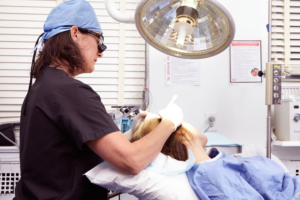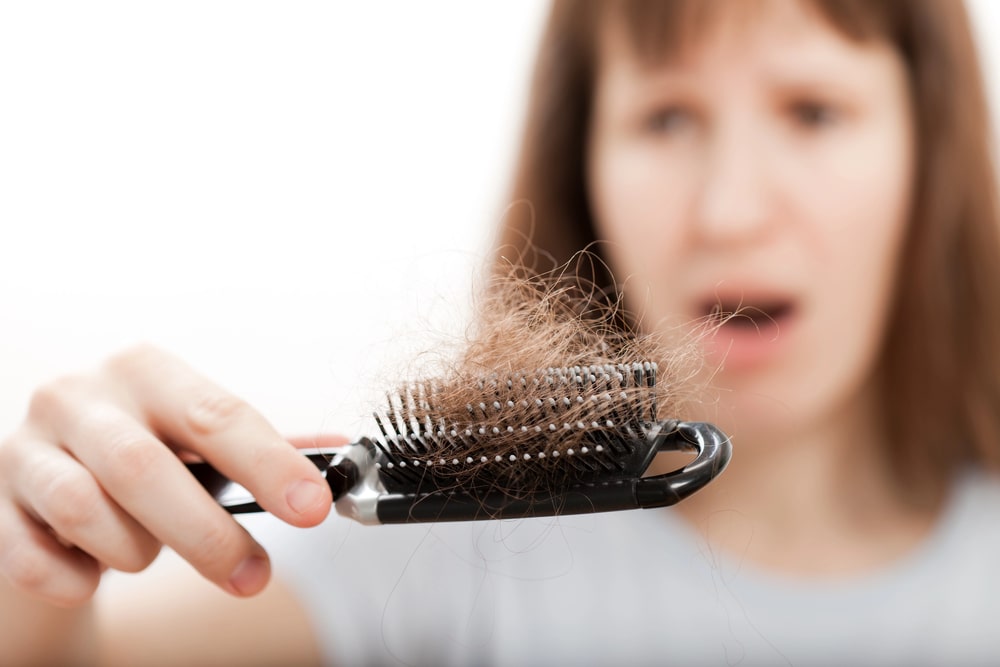Hair Loss Treatment Options For Women
 Most people think that hair loss problems are reserved for men, but our New York hair transplant specialists will tell you that New York women’s hair loss treatment options are on the rise! In fact, hair loss is a common side effect for women who have reached menopause, as the “golden years” are generally brought on by a hormonal shift that decreases estrogen–the hormone most responsible for promoting hair growth. Women’s hair loss treatment in NYC can often be confusing; and frankly, many spa and online remedies are simply for the birds! Dr. Robin Unger and Dr. Williams have tried and true New York women’s hair loss treatment options that will help you keep or regain the hair that makes you feel beautiful.
Most people think that hair loss problems are reserved for men, but our New York hair transplant specialists will tell you that New York women’s hair loss treatment options are on the rise! In fact, hair loss is a common side effect for women who have reached menopause, as the “golden years” are generally brought on by a hormonal shift that decreases estrogen–the hormone most responsible for promoting hair growth. Women’s hair loss treatment in NYC can often be confusing; and frankly, many spa and online remedies are simply for the birds! Dr. Robin Unger and Dr. Williams have tried and true New York women’s hair loss treatment options that will help you keep or regain the hair that makes you feel beautiful.
- Eliminate stress: While that may be easier said than done, it’s an important factor in keeping the hair that you have. Stress can often amplify the hormonal changes you’re going through and thereby, increase the thinning of your hair.
- Watch your diet: You are what you eat! Reducing saturated fats and increasing your intake of whole grains and fruits and vegetables will not only help regulate your changing hormones, but keep your feeling healthy and happy (which might help with eliminating that stress in tip #1). Keeping hydrated will also help keep the hair you have healthy and strong.
- Add some vitamins: B6 and folic acid can be used as a women’s hair loss treatment in Manhattan, as these vitamins are commonly associated with reinforcing the follicles of your hair–keeping it healthy and strong!
- Exercise: Aerobic exercise releases endorphins that help regulate the shifting of estrogen and testosterone. Not only can this help your hair, but endorphins are commonly known as the “happy hormone” and can improve your mood, and keep mood swings from taking over
-
These treatments may not be enough in some cases. When your hair and how you feel about it can make or break your self esteem, you can always turn to the women’s hair loss treatment in Manhattan in which our office specializes. Follicular Unit Transplantation is a very reliable solution for women who are suffering from hair loss and thinning due to menopause. It works by establishing transplanted hair follicles in areas of concern. Even in the most advanced cases of hair loss, hair follicles moved from appropriate donor areas (generally areas of hair-bearing fringe) to a bald or balding area on the same patient’s scalp will take root and grow.
Menopausal Hair Thinning
 Of all the many side effects of menopause, hair loss and thinning is one that many women find particularly distressing—and understandably so. During menopause, estrogen, the hormone most responsible for promoting hair growth, decreases and while estrogen (and progesterone) levels drop, testosterone levels increase disproportionately. This acts as a double “whammy” so to speak as this hormonal imbalance causes the hair that does grow to be thinner than before (and can also cause facial hair).
Of all the many side effects of menopause, hair loss and thinning is one that many women find particularly distressing—and understandably so. During menopause, estrogen, the hormone most responsible for promoting hair growth, decreases and while estrogen (and progesterone) levels drop, testosterone levels increase disproportionately. This acts as a double “whammy” so to speak as this hormonal imbalance causes the hair that does grow to be thinner than before (and can also cause facial hair).
Several strategies can help though. It may sound simple (but, please, in no way patronizing) try to relax. The truth is it’s important to keep stress managed to help preserve hormonal balance. Next, watch your diet. Reduce your intake of saturated fats and increase your intake of whole grains and fruits and vegetables. Vitamin B6 and folic acid may also help stimulate hair growth so adding that to your health plan would be wise should you find yourself in the midst of menopause and suffering from hair loss and thinning. Also exercise helps contribute to good hormonal balance. So be sure to get outside, take a walk with a friend or go to the gym. And be sure you are drinking enough water. It may sound somewhat basic adequate hydration is key to keeping the body functioning properly. If you can, try to stay away from hair care products that contain chemicals and dyes as well as avoiding very heat-heavy treatments as they can compromise hair and scalp health. This won’t stop hair from falling out or thinning as a result of menopause but it will help maintain and keep healthy the hair you do have. Be sure that the medicine your doctor has prescribed for menopause is not contributing to your hair loss and thinning. If it is, see if there is are alternatives.
Hair loss and thinning occurring during menopause can have a very significant impact on a woman’s mental health and wellbeing. To put is plainly: female hair loss and thinning is deeply embarrassing for most women. Add that to the fact that it is much less socially acceptable for women to suffer hair loss and thinning than it is for men and the combination is quite severe. And while the above will help, the only real true way to regain the lost hair is with an artfully and medically appropriate hair transplant. Follicular Unit Transplantation provides a very solid and reliable solution for women who are suffering from hair loss and thinning due to menopause. This is because it is well established that transplanted hair follicles (roots moved from their original location to another area) will behave as they did in their original site. Even in the most advanced cases of hair loss, hair follicles moved from appropriate areas of this hair-bearing fringe (the donor area) to a bald or balding area on the same patient’s scalp (the recipient area), will take root and grow. Continuing hair growth in such transplants has been observed since 1958, and it is believed that the hairs will continue to grow for the individual’s lifetime – provided that it would have done so at its original site. This is the type of procedure that works best for women who are suffering from hair loss and thinning due to menopause and one that Dr. Unger has perfected.

Steps Involved In The Women’s Hair Loss Treatment Process
Hair loss in women can be challenging, but with the right approach, effective treatment is possible. As a trusted provider of New York Women’s Hair Loss Treatment, we follow a structured process that allows us to address the causes of thinning hair and recommend solutions designed to restore confidence.
Dr. Robin Unger has over 25 years of experience and is a diplomate of the American Board of Hair Restoration Surgery. If you are considering pursuing hair loss treatment, you can trust our team to provide the care that you need. Contact our office today.
Initial Consultation And Assessment
The first step is meeting with our New York women’s hair loss treatment doctor for a thorough evaluation. We discuss medical history, lifestyle factors, and family background to identify potential causes of hair loss. A scalp examination and, in some cases, additional tests help us determine the best direction for treatment. This step ensures we understand the unique factors affecting each patient and provide the most effective treatment possible.
Diagnosis Of Hair Loss Pattern
Once we gather the necessary information, we analyze the specific type of hair loss. Women may experience diffuse thinning, pattern-related hair loss, or conditions caused by hormones, stress, or illness. Accurate diagnosis allows us to develop a treatment plan that addresses the patient’s specific condition. We recognize the importance of tailoring care to the individual.
Discussion Of Treatment Options
After diagnosis, we review the different treatment paths available. Options may include hair restoration surgery, platelet-rich plasma (PRP) therapy, topical solutions, or medications. Some patients may benefit from a combination of these approaches. During this stage, we explain how each treatment works, the expected outcomes, and what the process involves. Our goal is to give patients clear information so they can make decisions that feel right for them. We are adept at a variety of transplant methods and treatments, and we will help you find the best path forward for you and your hair.
Customized Treatment Plan
Every patient receives a plan based on her unique needs. For surgical options, we discuss procedures such as Follicular Unit Extraction (FUE) or Follicular Unit Transplantation (FUT). Non-surgical choices like PRP therapy or other medical treatments are also considered. By building a plan specific to the patient, we help set realistic goals while focusing on results that look natural.
Implementation Of Treatment
The next step is carrying out the selected treatment. If surgery is chosen, our NY women’s hair loss treatment doctor carefully performs the procedure to achieve natural placement of hair. For non-surgical therapies, treatments are scheduled in sessions designed for optimal benefit. Regardless of the method, patient comfort and safety remain priorities. We guide patients through each phase so they understand what to expect.
Ongoing Care And Follow-Up
Hair restoration does not stop after the initial treatment. Follow-up appointments allow us to monitor progress and make adjustments as needed. For surgical patients, this includes tracking growth and healing. For non-surgical therapies, we assess how well the treatments are working and adapt as necessary. Long-term care helps patients maintain results and promotes healthier hair overall. It is important to stick to the recommended treatment and care plan in order to achieve the best results for your hair and your health.
At our practice, we understand that every patient’s experience with hair loss is unique. By following a step-by-step process, we provide care that is structured, supportive, and effective. If you are considering treatment, we invite you to connect with us. With the guidance of Dr. Robin Unger, our team is here to discuss your options and develop a plan that best meets your needs.
Resources:
Female Hair Transplant Surgery
Contact Dr. Unger for Women’s Hair Loss Treatment – NYC
As women themselves, Dr. Unger and Dr. Williams are very sensitive to the needs of their patients who are suffering from menopause related hair loss and thinning. So if you’re concerned about losing a part of you that you’ve always thought made you, you, look to a New York women’s hair loss treatment that works – contact us today!
Client Review
“Dr. Unger is extremely knowledgeable about hair loss and its causes. She took time asking and answering questions and was the first doctor to give me an accurate diagnosis. Her kindness and professionalism were very much appreciated and I left her office feeling hopeful and positive. I could not recommend her more highly. ”
Lisa Ross




